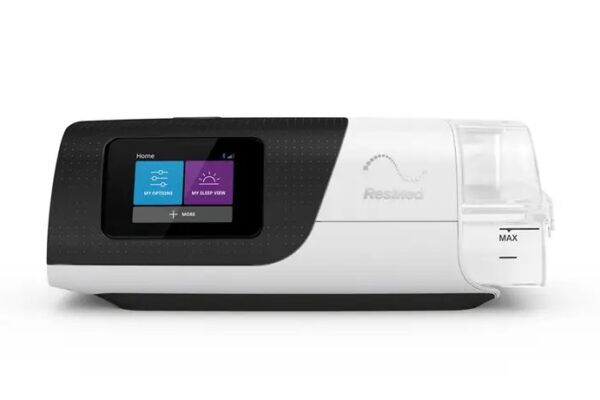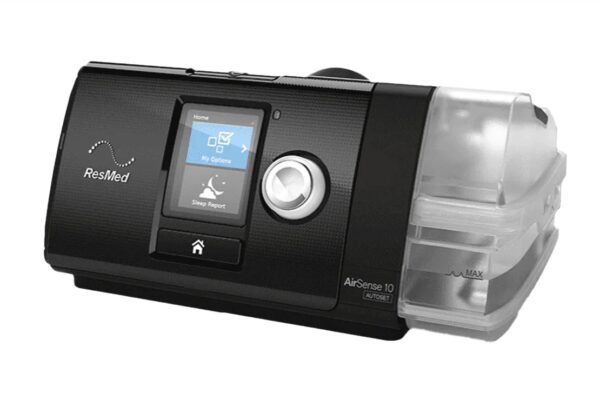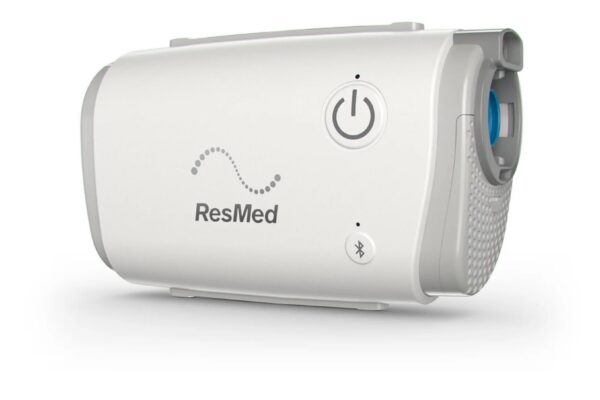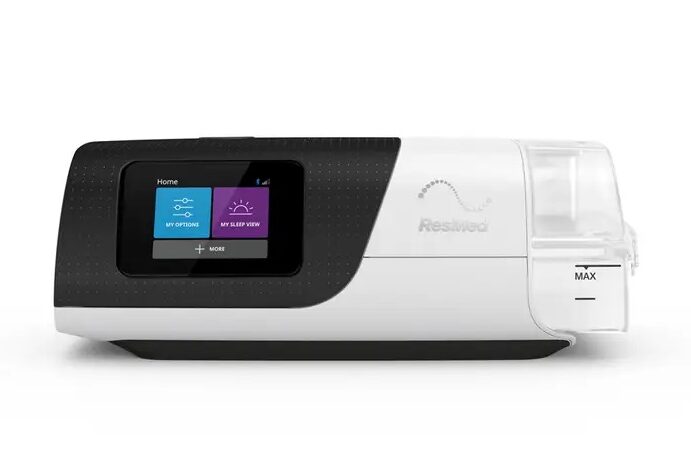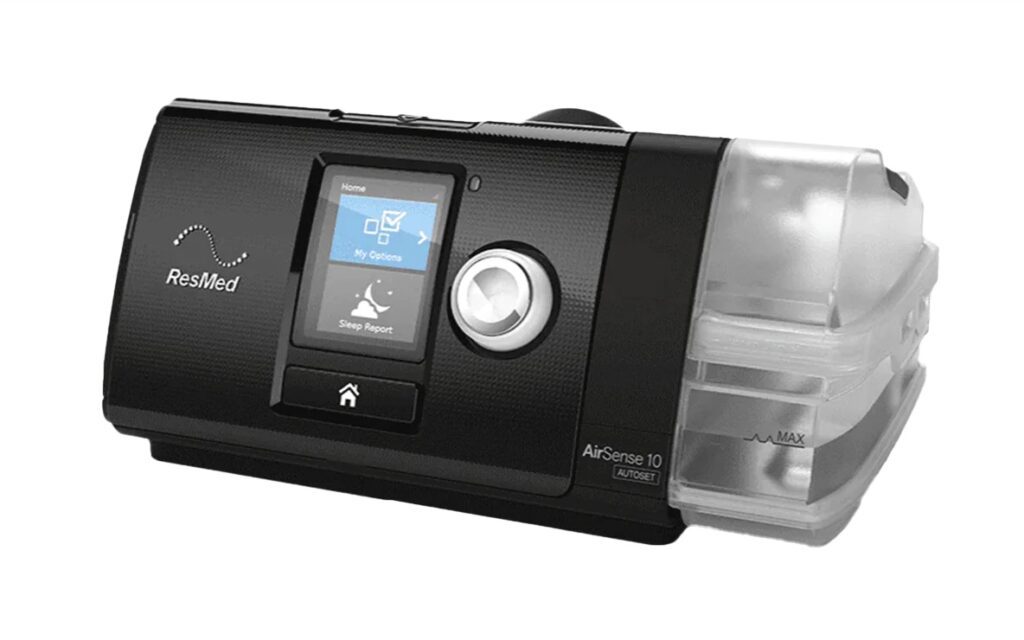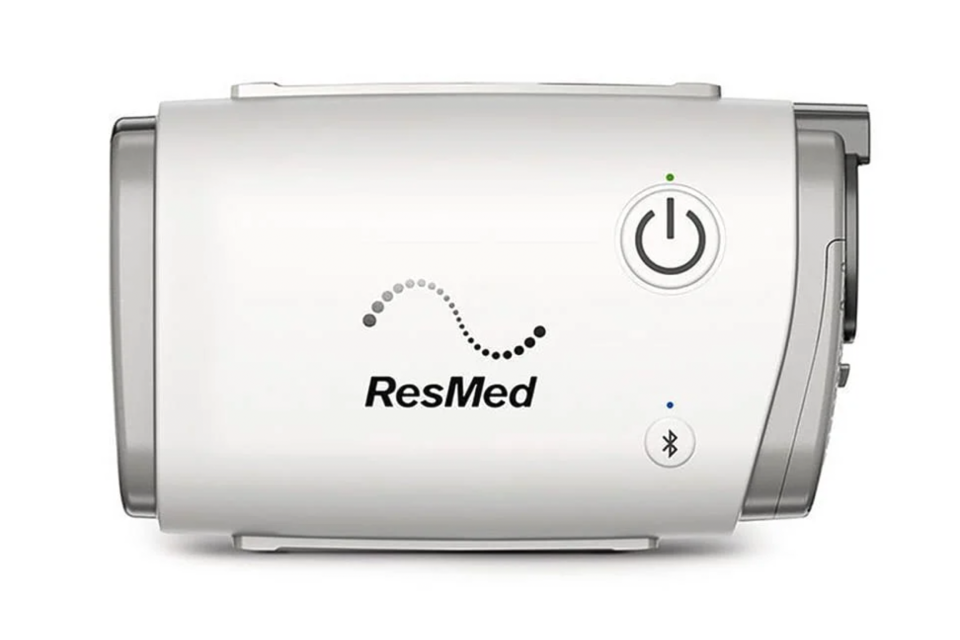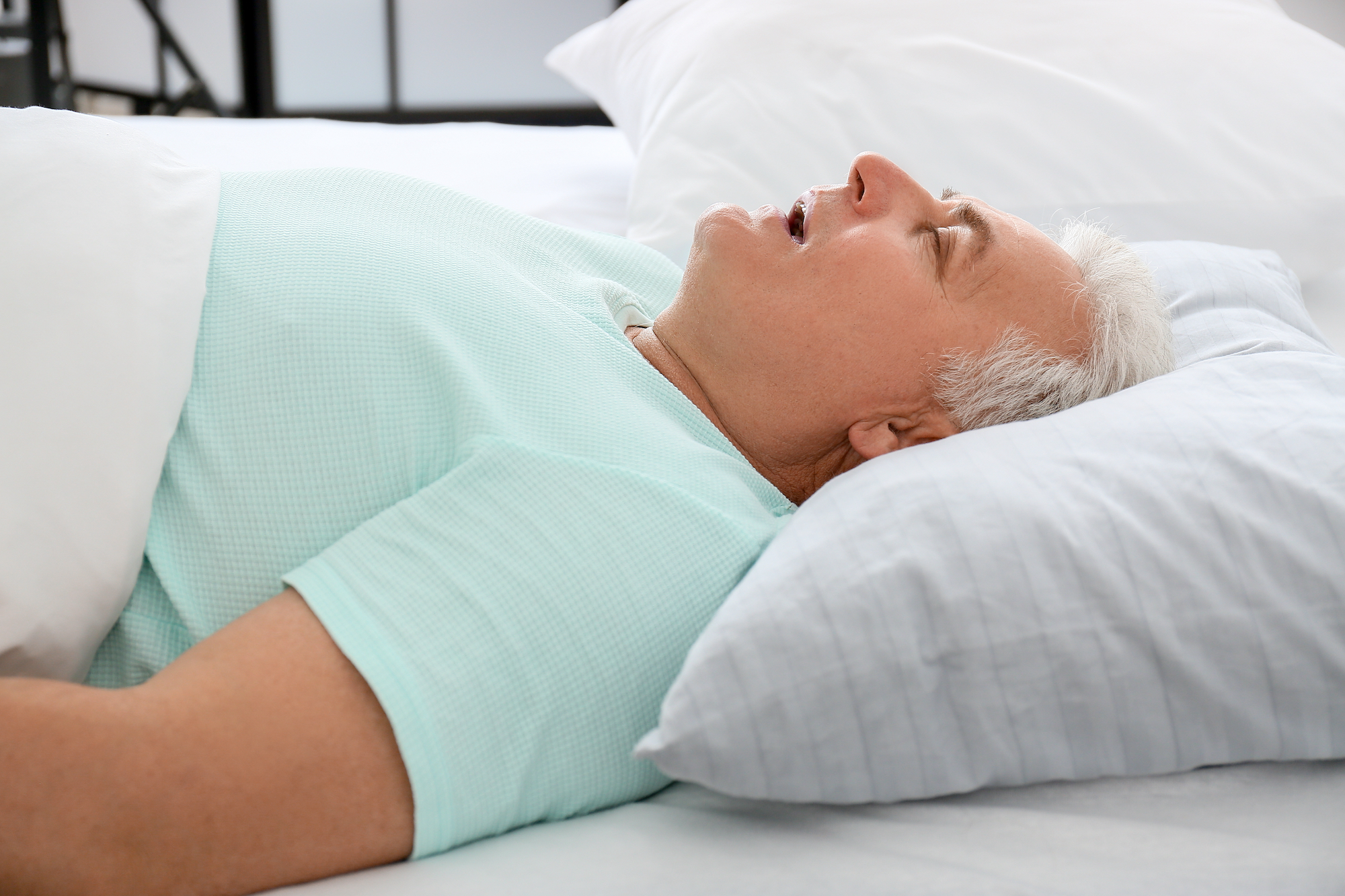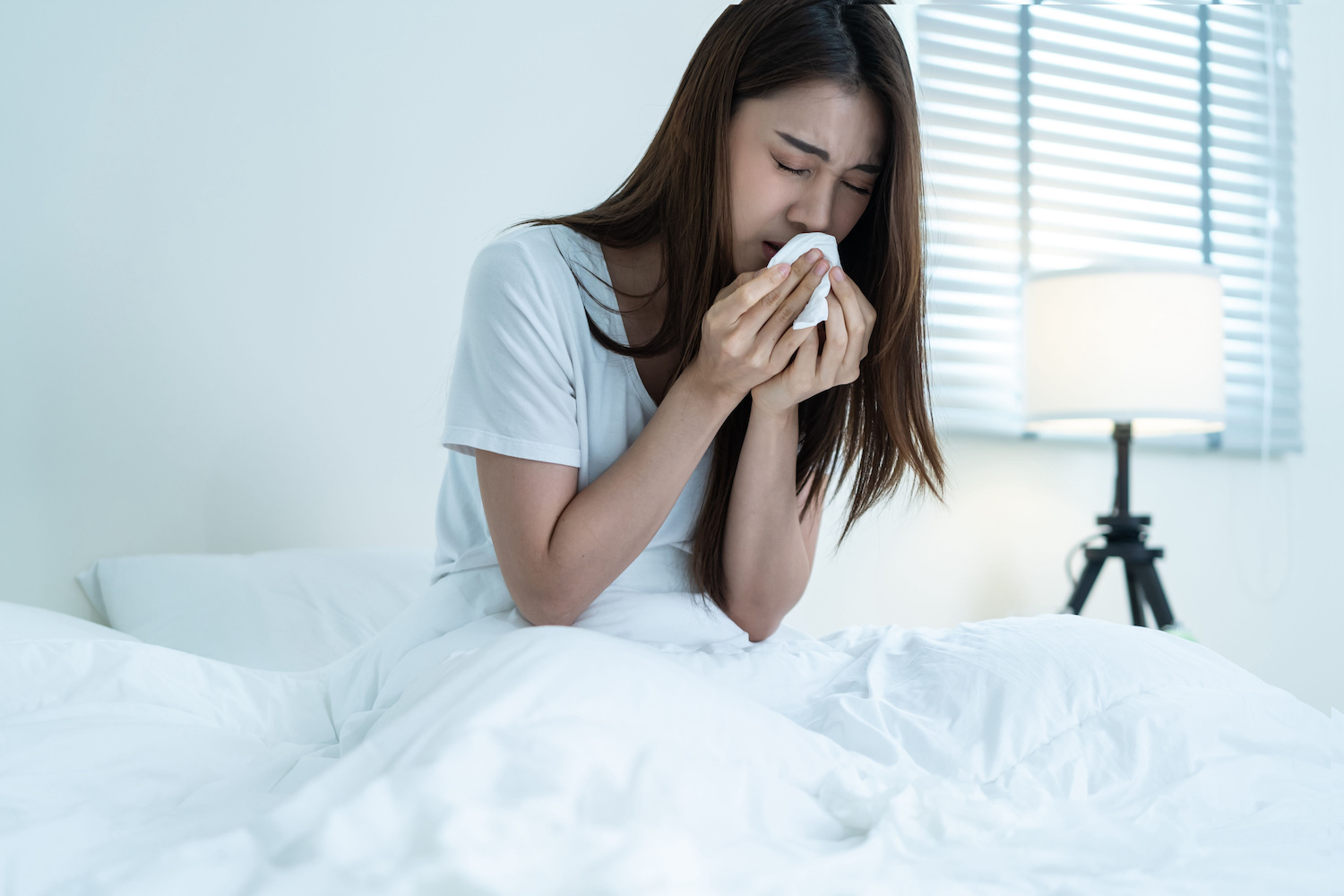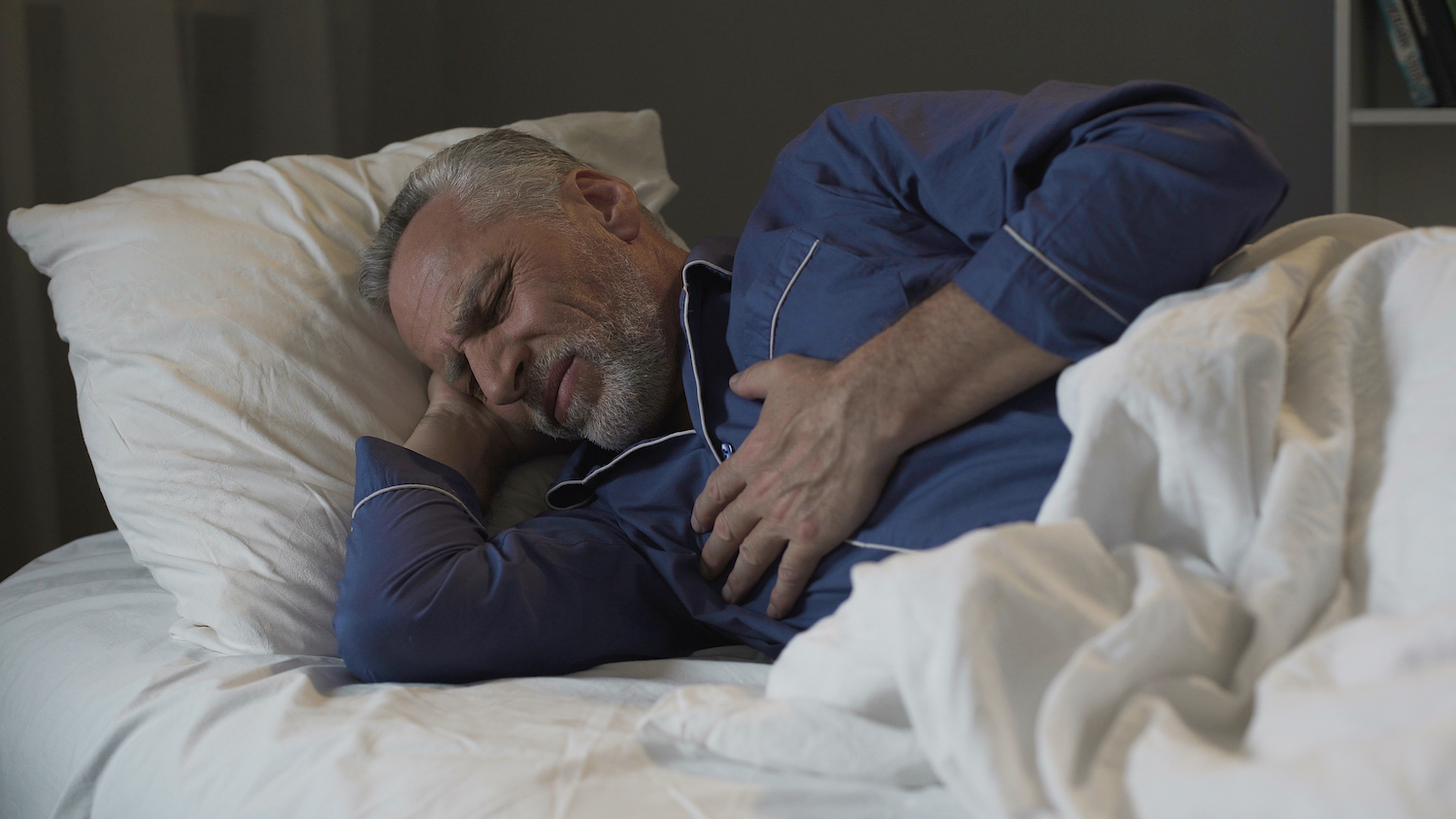People with obstructive sleep apnea (OSA) gasp, choke, or stop breathing while they sleep. This can cause excessive sleepiness, irritability, and difficulty maintaining concentration. Those with untreated OSA may also be at risk for serious conditions like heart disease, cognitive problems, and depression.
Though there are multiple treatments for sleep apnea, continuous positive airway pressure (CPAP) therapy is one of the most effective ways to mitigate symptoms in people with OSA. CPAP therapy is a method of opening a sleeper’s obstructed breathing passages by delivering a consistent amount of pressurized air through a face mask.
We’ll take a close look at some of the best CPAP machines on the market today and how to choose one. You’ll learn about the features specific to each model, as well as their pros and cons. We’ll also cover best practices for owning a CPAP machine, from cleaning guidelines and insurance considerations to CPAP accessories and data tracking.
Best Overall
ResMed AirSense 11 AutoSet CPAP Machine
Ideal For
- People who want detection features and online support
- Those looking for individual sleep recommendations and maximum connectivity
- Shoppers who want a machine with gender-specific options
Who should keep looking
- Budget shoppers
- Those who don’t need an integrated humidifier
- People who don’t want to track their sleep data
-
Price
$1,499
-
Dimensions
10.2″ x 5.5″ x 3.7″
-
Noise Rating
27 dBA
-
Weight
2.5 lbs.
The ResMed AirSense 11 AutoSet CPAP Machine has premium features, a modern design, and powerful performance. In addition to features like a built-in humidifier and a ramp function, this machine also has an app that tracks your sleep data and helps troubleshoot issues. Though it carries a high-end price tag, it has the extras to make the added cost worth it for many shoppers.
This machine is small, quiet, and light. It weighs 2.5 pounds and has a 27-decibel noise rating. It also has an auto-adjust setting that changes airflow with your breath. Additionally, the device features a gender-based algorithm that lets users select an “AutoSet for Her” mode tailored for disordered breathing patterns associated with women who have sleep apnea.
One of this machine’s most noteworthy features is its compatible app, which tracks sleep data, eases setup issues, and offers customized coaching that takes your needs into account. Your daily sleep score can help you pinpoint issues and change sleep habits.
The machine’s touchscreen is sleek and simple to use. The 65-watt power supply unit offers constant power that keeps your machine running throughout the night. In addition to the machine, each purchase includes tubing, a filter, and a travel bag. ResMed backs this device with a two-year warranty.
Use this SleepApnea.org link for the most current discount on ResMed products
Shop NowBest Value
ResMed AirSese 10 AutoSet Connected with HumidAir and ClimateLineAir
Ideal For
- People who struggle to breathe during CPAP with a fixed pressure setting
- Those who are prone to congestion
- Sleepers who need time to ease into their therapy before falling asleep
Who should keep looking
- Those who don't need automatic pressure adjustments to sleep comfortably
- People seeking a machine that compensates air when leaks occur
- Sleepers who prefer CPAP machines with external humidifiers
-
Price
$1,164
-
Dimensions
4.57 x 10.04 x 5.91
-
Noise Rating
27 dBA
-
Weight
2.75 lbs.
Many CPAP users sleep most comfortably with machines that automatically adjust pressure levels based on their breathing patterns, but for many, these devices are prohibitively expensive. The ResMed AirSense 10 AutoSet Connected with HumidAir and ClimateLineAir offers the flexible comfort of an automatic CPAP machine at a reasonable stick price, giving shoppers the best of both worlds.
One defining feature is the Smart Start technology, which powers on the machine as soon as your mask is secure and turns it off when the mask is removed. The HumidAir heated humidifier is also noteworthy. By increasing the water temperature, the machine can reduce rainout and help you breathe more comfortably.
The AirSense 10 AutoSet comes with ClimateLineAir heated tubing. You can adjust the tubing's temperature and humidity settings to ensure you'll receive enough heat and moisture to sleep comfortably without dryness or congestion.
An auto-ramp allows you to ease into your therapy for up to 45 minutes after you go to bed. This is especially useful for people who have been prescribed high pressure levels. The user-friendly control panel features a crisp LCD display, and automatically adjusts the brightness based on your bedroom's light level. At 2.75 pounds, the machine is fairly light, and it's FAA-compliant for in-flight use, so the AirSense 10 AutoSet is more travel-friendly than many competing devices intended for at-home therapy.
Standard ground shipping is free of charge. Unused, unopened devices may be returned within 60 days for a full refund.
Use this SleepApnea.org link for the most current discount on ResMed products
Shop NowBest for Travel
ResMed AirMini AutoSet Travel CPAP Machine
Ideal For
- Those looking for a CPAP machine able to be used on a plane
- People who want a waterless humidification system
- Tech-savvy CPAP users seeking a compatible app
Who should keep looking
- People unwilling to buy a mask setup pack to ensure compatibility
- Those looking for long-term data storage
- Anyone who needs to use a CPAP machine above 8,500 feet
-
Price
$968
-
Dimensions
5.4″ x 3.3″ x 2.1″
-
Noise Rating
29 dBA
-
Weight
0.66 lbs.
The ResMed AirMini AutoSet Travel CPAP Machine is a portable model that doesn’t sacrifice power to make up for its compact design. This machine weighs 10.6 ounces, which is significantly lighter than most other CPAP machines on the market. It has a sound output of 30 decibels, meaning it’s about as loud as a whisper.
Traveling with this machine is simple. It’s FAA compliant for use on an airplane and has a built-in converter that’s designed to work internationally. Its patented HumidX waterless humidification system eliminates the need to travel with bottles of distilled water. The machine is compatible with an app for iOS and Android devices that allows you to access 30 days worth of sleep data on your smartphone.
Despite its small size, this machine has settings and functionality comparable to a larger device. The proprietary AutoRamp feature starts your therapy at a lower setting to allow time for you to fall asleep before increasing pressure when it detects sleep onset. The Expiratory Pressure Relief feature gently decreases pressure while you exhale, which helps ensure you can breathe easily against the air coming into your mask.
Shoppers wishing to buy this CPAP machine should ensure their current mask is compatible or purchase an AirMini setup pack. The machine is backed by a two-year warranty.
Use this SleepApnea.org link for the most current discount on ResMed products
Shop NowWhy We Picked These
Our team of sleep product experts regularly researches CPAP machines and other products that treat sleep apnea to bring readers the most accurate and up-to-date information possible. Our knowledge and expertise within the sleep industry ensures that we’re able to provide comprehensive information that makes shopping for a CPAP machine easier.
We take all of a machine’s features and functions into consideration when recommending it to our readers. We also keep abreast of what machines are in stock and which devices have been recalled. Our top picks are devices with a successful track record from trusted brands that have consistently high customer reviews.
What You Should Consider When Choosing a CPAP Machine
Selecting the correct CPAP machine is important. In addition to expense, there are other factors like noise level, available settings, and extra features to think about. We’ll help you learn what you should consider when shopping for a CPAP machine.
Pricing and Sizing
CPAP machines vary in price depending on what kind of features they offer, their size, and their noise level. Most CPAP machines cost between $350 and $1,000, though prices can reach $3,000 for specialized options. Keep in mind that some insurance plans may partially or completely cover the cost of a CPAP machine.
Automatic positive airway pressure (APAP) and bilevel positive airway pressure (BiPAP) devices often cost more because they have more advanced pressure settings. These machines can cost up to $6,000.
Most devices are small enough to rest on your nightstand and light enough that you can lift them easily with one hand. Though exact sizes vary, many machines are less than 12 inches long, 8 inches wide, and 6 inches tall. Most machines weigh less than 5 pounds. Make sure to factor your tubing and humidifier into space requirements before making your purchase.
Noise Level
CPAP machines measure noise level using A-weighted decibels (dBA), which is a common unit of noise measurement for frequencies that correspond with the auditory capacity of the human ear.
The average CPAP machine has a 30 dBA rating, which is similar to someone whispering nearby. The quietest CPAP machines can have ratings as low as 25 dBA. Many manufacturers design their machines to be as quiet as possible.
Pressure Ranges and Ramp Settings
Each CPAP user has a specific pressure setting prescribed by their doctor. Most CPAP machines have pressure settings that can deliver between 4 and 20 centimeters of water pressure (cm H2O).
Some CPAP machines have a ramp setting, which starts therapy with lower pressure and gradually ramps it up as you fall asleep. This feature can make it easier to settle into bed and get accustomed to the pressurized air.
Data Tracking and Smart Features
You can opt for a CPAP machine that tracks your sleep data. Some allow you to view reports directly on their interfaces, while others connect to a corresponding smartphone app. Though specifics can vary between machines, they all typically track how many hours you slept, the effectiveness of your mask’s seal, and the number of apnea events that occurred during sleep.
These measurements allow you to provide your doctor with tangible data to better control your sleep apnea. You can also use this information to set benchmarks to help improve long-term sleep apnea symptoms.
Leveraging Smart Features
In addition to standard functions like pressure and ramp settings, you can purchase a CPAP machine with extra features like heated tubing, humidifier heaters, and Wi-Fi or Bluetooth connectivity.
Using a CPAP humidifier can help you stick with the therapy, as the extra moisture increases therapy adherence for many sleepers. Heated tubing and preheating options keep the humidifier’s water at a comfortable temperature. Additionally, these features can help ensure you don’t experience rainout, which is when condensation settles in your tube and/or mask and leaves your face damp upon awakening. It can also make an annoying “ping” or popping noise.
Do You Need a Prescription for a CPAP Machine?
A prescription is required to purchase and use a CPAP machine. The first step to addressing sleep apnea is to speak with your physician. If they think it’s necessary, your doctor will set up a sleep study that measures your breathing and tracks how many apneic and hypopneic events you have while sleeping. An apnea is when breathing stops, while hypopneas refer to episodes of shallow breathing.
Following this study, your doctor may order a CPAP titration study, in which you are connected to a CPAP machine overnight in a sleep lab to determine your ideal CPAP pressure settings. After these initial steps, your doctor may prescribe you a CPAP machine.
Where Can You Buy a CPAP Machine?
After you get a prescription from your doctor, you can purchase a CPAP machine. Your prescription will dictate which type of machine you can purchase, then you can decide whether to shop in a store or online. Your insurance plan may also stipulate where you can purchase your device.
CPAP machine manufacturers have authorized retailers that sell their products. Some of these are only online and ship directly to the consumer, while others allow you to shop at a brick-and-mortar store.
Medical device stores allow you to shop in person and see a device before committing to it. However, they tend to have fewer choices than online retailers.
Will Your Insurance Cover the Cost of a CPAP Machine?
Most insurance plans cover at least a portion of CPAP machine costs. However, you may be responsible for necessary accessories like masks, tubing, and filters. Before determining an amount of coverage, your insurance provider may look at your apnea-hypopnea index (AHI), a measurement of the average number of times you stop breathing or breathe shallowly in an hour.
Some insurance companies cover the device upon purchase, while others have rent-to-own or reimbursement strategies. Many insurers have a compliance period, during which they require proof that you’re regularly using your CPAP machine according to your prescription.
Does Medicare Cover Your CPAP Machine Costs?
Medicare may cover portions of CPAP machine costs as long as you follow specific guidelines. Following a diagnosis of obstructive sleep apnea, Medicare may cover a three-month trial period. Once you meet your Part B deductible, you will be responsible for a 20% copay covering the machine rental cost and the purchase of CPAP supplies like masks and tubing over a 13-month period after the end of the trial. You’ll own the machine outright after making the rental payments for 13 months and continuously using your machine correctly during that period.
You must be enrolled in Medicare to qualify. Check with your physician and insurance provider for exact terms.
CPAP Accessories and Compatibility
Certain CPAP accessories are necessary for therapy. You can’t use your CPAP machine without a mask and connective tubing. In addition to these essential components, there are other accessories that can help make CPAP therapy more effective and comfortable.
CPAP Pillows
CPAP pillows have specific designs meant to accommodate CPAP masks. These pillows have strategic shapes or cutouts that allow you to sleep comfortably without causing your mask to leak, slip off, or press too deeply into your skin.
Accessories
Cleaners
You must regularly clean your CPAP machine, mask, tubing, and other accessories. While there are multiple types of CPAP wipes and sanitizers on the market, it is still recommended to frequently clean your device’s components with mild soap and warm water.
The Food and Drug Administration has cautioned consumers about CPAP cleaners that use ozone gas and ultraviolet light, as these products haven’t been approved by the FDA and may pose health risks.
Filters
CPAP filters help protect both your lungs and CPAP machine from impurities. You can purchase disposable or nondisposable CPAP filters. Some machines have specific filters you must use, so check your device’s instructions for exact specifications.
External Batteries
An external battery safeguards against power outages or surges. You can also use an external battery when you don’t have access to a power outlet, such as when traveling or camping.
Humidifiers
CPAP humidifiers help keep your throat and nose moist by increasing the humidity of the pressurized air. Some machines have built-in humidifiers, while others require an external device.
Hosing
Hosing connects your CPAP machine to your mask. You can purchase hosing in many different lengths. If you wake up with water inside your mask, you may want to purchase heated tubing, which is designed to cut down on condensation.
Headgear
While CPAP masks come with headgear to ensure the mask stays in place while you sleep, many retailers also sell headgear separately. There are multiple types of masks, including full-face masks, nasal masks, and nasal pillows, so be sure to check compatibility before purchasing supplemental headgear.
Compatibility of Your CPAP Device With Accessories
There are many different companies that manufacture CPAP machines and accessories, with numerous models and product styles between them. As a result, you need to ensure that the machine and accessories you choose are compatible with one another. Choosing CPAP products from the same manufacturer can help cut down on compatibility issues and ensure your CPAP therapy is effective.
Types of Sleep Apnea Machines: CPAP, BiPAP, and APAP
While CPAP therapy is typically the first-line treatment for obstructive sleep apnea, some people don’t respond well to the continuous pressure or have difficulty using their machine consistently due to discomfort. In these scenarios, a doctor may prescribe either automatic positive airway pressure (APAP) or bilevel positive airway pressure (BiPAP).
CPAP
Most CPAP machines have pressure settings that range between 4 and 20 cm H2O. Once you settle on a setting with your doctor, the machine delivers the same amount of pressure throughout the night. Some machines have ramp functions that gradually increase the pressure level to ease users into their nightly CPAP therapy.
Travel CPAP
Travel CPAP machines function the same way as traditional CPAP machines, but they are smaller, more portable, and sometimes FAA-compliant for use on airplanes. Certain machines also have portable battery packs and flexible charging options.
BiPAP
BiPAP machines use two different pressure settings. The air pressure is higher when you inhale than it is when you exhale. BiPAP machines typically have a wider pressure range than CPAP machines, with available settings between 4 and 25 cm H2O — and some going as high as 30 cm H2O. BiPAP is often considered a good option for people who need high pressure settings greater than 15 cm H2O or for people with certain pulmonary conditions.
APAP
An APAP machine measures how much air you need at any given moment and automatically adjusts the air pressure accordingly. Like BiPAP machines, APAP machines may have expiratory relief settings, but they are different than BPAPs. Some users find APAP machines more comfortable, leading to better therapy adherence.
CPAP Machines
People with obstructive sleep apnea have difficulty breathing while they sleep due to a physical blockage in the upper airway caused by their tongue or the collapse of airway tissues. A CPAP machine delivers a constant stream of pressurized air that forces the airway to stay open, thus minimizing the number of breathing disturbances.
Many CPAP machines come equipped with humidifiers that add moisture to the pressurized air to help prevent potential side effects such as dry mouth. To prevent the buildup of limescale deposits and potentially harmful bacteria, you should use distilled water instead of purified water in your CPAP humidifier.
Distillation involves boiling water and condensing the vapor back to liquid. This process ensures that minerals, impurities, and bacteria are removed. While purified water is filtered to remove chemicals, it could still have mineral content that is safe to drink but prone to causing buildup in your machine.
You should clean your CPAP machine daily using mild soap and warm water. First, check that your machine is unplugged, then disassemble the power base, mask, and tubing. Wash the inside and outside of the tubing by submerging it in warm soapy water. Check the manufacturer’s recommendations when washing hoses with electrical components.
Wash your mask — including its headgear, cushion, and frame — with mild soap and water, ensuring that you clean any facial or hair oils off the surface. If your CPAP machine includes a humidifier, clean the humidifier by soaking it with one part white vinegar and one part water. Rinse all accessories with water and air dry before reassembling your device.
You don't need a CPAP cleaner or machine to clean your CPAP machine. Many CPAP cleaning machines on the market use ozone or UV light to clean the hoses and tanks of CPAP machines. The FDA now warns against using these cleaning machines due to potential health risks. The FDA has reported that exposure to the chemicals used in these cleaning machines can lead to respiratory infections. Using these cleaners with your CPAP machine may also void the warranty.
Still have questions?
Sleep apnea products can be confusing. If you need individualized assistance, send us an email at [email protected] with your questions and we'll help find the best fit for you.


